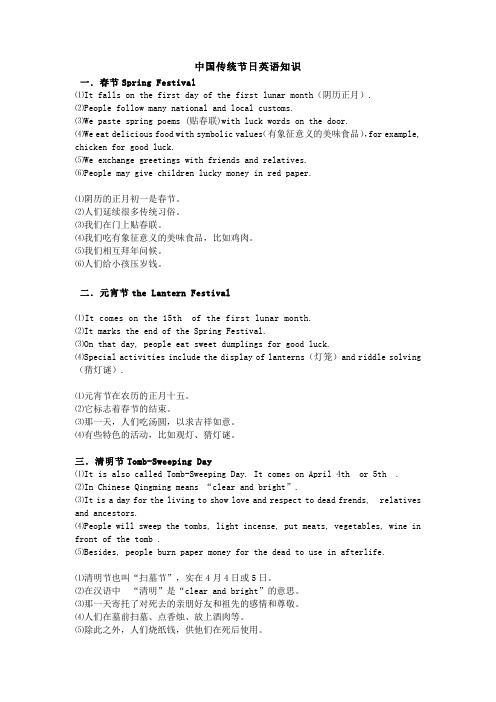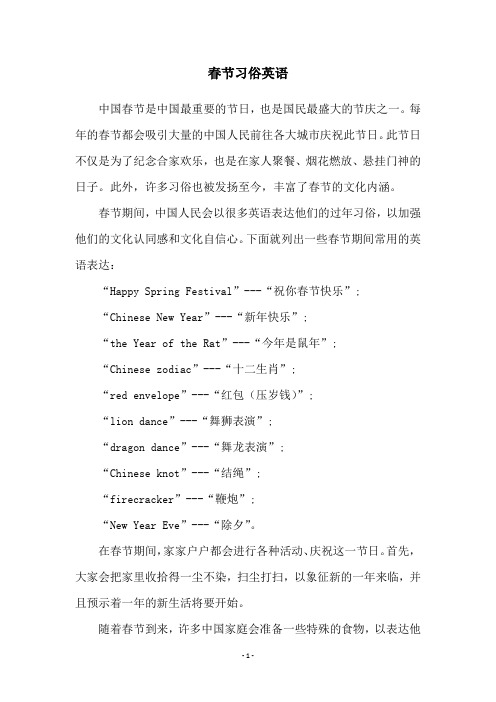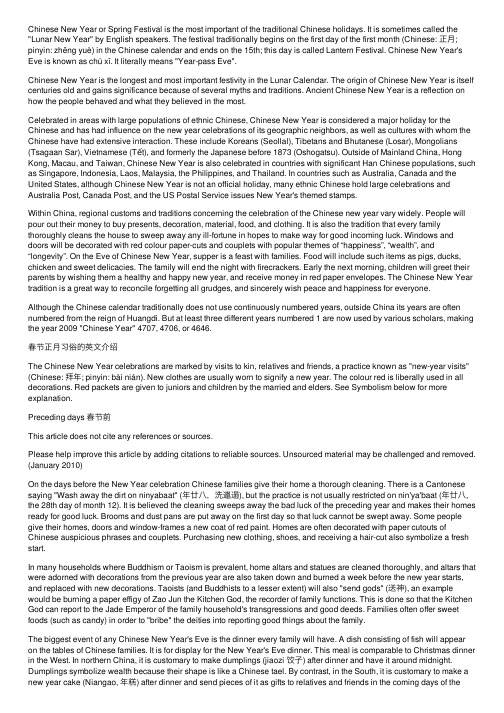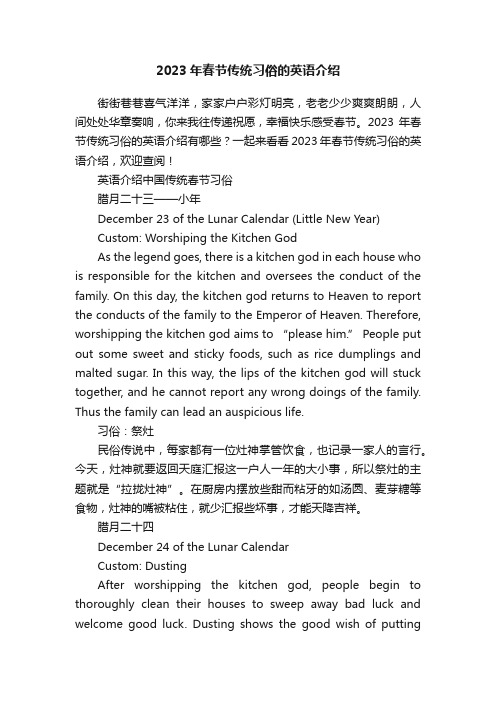中国春节习俗英语怎么说
中国传统节日英语知识

中国传统节日英语知识一.春节Spring Festival⑴It falls on the first day of the first lunar month(阴历正月).⑵People follow many national and local customs.⑶We paste spring poems (贴春联)with luck words on the door.⑷We eat delicious food with symbolic values(有象征意义的美味食品),for example, chicken for good luck.⑸We exchange greetings with friends and relatives.⑹People may give children lucky money in red paper.⑴阴历的正月初一是春节。
⑵人们延续很多传统习俗。
⑶我们在门上贴春联。
⑷我们吃有象征意义的美味食品,比如鸡肉。
⑸我们相互拜年问候。
⑹人们给小孩压岁钱。
二.元宵节the Lantern Festival⑴It comes on the 15th of the first lunar month.⑵It marks the end of the Spring Festival.⑶On that day, people eat sweet dumplings for good luck.⑷Special activities include the display of lanterns(灯笼)and riddle solving (猜灯谜).⑴元宵节在农历的正月十五。
⑵它标志着春节的结束。
⑶那一天,人们吃汤圆,以求吉祥如意。
⑷有些特色的活动,比如观灯、猜灯谜。
三.清明节Tomb-Sweeping Day⑴It is also called Tomb-Sweeping Day. It comes on April 4th or 5th .⑵In Chinese Qingming means “clear and bright”.⑶It is a day for the living to show love and respect to dead frends, relatives and ancestors.⑷People will sweep the tombs, light incense, put meats, vegetables, wine in front of the tomb .⑸Besides, people burn paper money for the dead to use in afterlife.⑴清明节也叫“扫墓节”,实在4月4日或5日。
春节习俗英语

春节习俗英语中国春节是中国最重要的节日,也是国民最盛大的节庆之一。
每年的春节都会吸引大量的中国人民前往各大城市庆祝此节日。
此节日不仅是为了纪念合家欢乐,也是在家人聚餐、烟花燃放、悬挂门神的日子。
此外,许多习俗也被发扬至今,丰富了春节的文化内涵。
春节期间,中国人民会以很多英语表达他们的过年习俗,以加强他们的文化认同感和文化自信心。
下面就列出一些春节期间常用的英语表达:“Happy Spring Festival”---“祝你春节快乐”;“Chinese New Year”---“新年快乐”;“the Year of the Rat”---“今年是鼠年”;“Chinese zodiac”---“十二生肖”;“red envelope”---“红包(压岁钱)”;“lion dance”---“舞狮表演”;“dragon dance”---“舞龙表演”;“Chinese knot”---“结绳”;“firecracker”---“鞭炮”;“New Year Eve”---“除夕”。
在春节期间,家家户户都会进行各种活动、庆祝这一节日。
首先,大家会把家里收拾得一尘不染,扫尘打扫,以象征新的一年来临,并且预示着一年的新生活将要开始。
随着春节到来,许多中国家庭会准备一些特殊的食物,以表达他们的热情。
举例来说,“Niangao”(糯米糕)是春节期间最具代表性的传统食物,它的英文翻译为“sticky cake”,意思是“粘粘的蛋糕”,它可以帮助家人团结和友爱,象征着一年的和睦与幸福。
此外,许多中国人还会准备“Jiaozi”(饺子)作为节日食物,其英文翻译为“dumpling”,意思是“小圆饼”,它还有另一个意思,那就是“财富和幸运”的象征。
春节期间,人们还会采取一些特殊的方式来表达他们的祝福,“Xin Nian Kuai Le”(新年快乐)是最流行的祝福语之一。
它的直译是“新年快乐”,用来祝福期望新的一年里好运相伴。
用英语表达春节习俗

⽤英语表达春节习俗⽤英语表达春节习俗(精选13篇) 春节的习俗因地域、民族、⽂化、经济条件的影响,呈现出巨⼤的差异性,也铸就了丰富多彩的传统⽂化。
我们要发扬光⼤这种优秀的传统⽂化,推动⽂化⾛出中国,融⼊世界。
怎样⽤英语告诉外国朋友春节的传统习俗?下⾯是⼩编整理的⽤英语表达春节习俗(精选13篇),希望对⼤家有帮助。
⽤英语表达春节习俗篇1 Chinese Spring Festival celebrating the end of winter and the warmth of spring. It began in the last day of the lunar year, end in the 15th day of lunar New Year, also is the Lantern Festival. During the Spring Festival, people use red lantern and Spring Festival couplets decorate a house, put on all kinds of colored clothes, often visit friends and relatives or together eat dumplings, fish, meat and other delicious food. The children are looking forward to receiving red envelope money, and together they play each other the fireworks, with happy. Street with dragon and lion dance and some other carnival activities, CCTV will held the grand Spring Festival gala. 中国的春节庆祝冬天的结束和温暖春天的来临。
春节传统习俗英文带翻译

The Spring Festival, also known as Chinese New Year, is the most important traditional festival in China. It is a time when families gather together to celebrate, and there are many traditional customs and practices associated with this holiday. In this article, we will explore some of the most common Spring Festival traditions and their significance.
In conclusion, the Spring Festival is a time of joy, celebration, and tradition for people in China and around the world. The customs and practices associated with this holiday are deeply rooted in Chinese culture and hold significant meaning for those who observe them. From red packets and family reunion dinners to lion dances and Spring Festival couplets, each tradition plays a special role in ushering in good fortune and prosperity for the coming year. These customs not only bring people together but also serve as a way to pass down the rich cultural heritage of the Chinese people to future generations. As we ring in the new year, let us embrace and cherish these time-honored traditions that make the Spring Festival so unique and meaningful.
春节习俗及英语介绍

Chinese New Year or Spring Festival is the most important of the traditional Chinese holidays. It is sometimes called the "Lunar New Year" by English speakers. The festival traditionally begins on the first day of the first month (Chinese: 正⽉; pinyin: zhēng yuè) in the Chinese calendar and ends on the 15th; this day is called Lantern Festival. Chinese New Year's Eve is known as chú xī. It literally means "Year-pass Eve".Chinese New Year is the longest and most important festivity in the Lunar Calendar. The origin of Chinese New Year is itself centuries old and gains significance because of several myths and traditions. Ancient Chinese New Year is a reflection on how the people behaved and what they believed in the most.Celebrated in areas with large populations of ethnic Chinese, Chinese New Year is considered a major holiday for the Chinese and has had influence on the new year celebrations of its geographic neighbors, as well as cultures with whom the Chinese have had extensive interaction. These include Koreans (Seollal), Tibetans and Bhutanese (Losar), Mongolians (Tsagaan Sar), Vietnamese (Tết), and formerly the Japanese before 1873 (Oshogatsu). Outside of Mainland China, Hong Kong, Macau, and Taiwan, Chinese New Year is also celebrated in countries with significant Han Chinese populations, such as Singapore, Indonesia, Laos, Malaysia, the Philippines, and Thailand. In countries such as Australia, Canada and the United States, although Chinese New Year is not an official holiday, many ethnic Chinese hold large celebrations and Australia Post, Canada Post, and the US Postal Service issues New Year's themed stamps.Within China, regional customs and traditions concerning the celebration of the Chinese new year vary widely. People will pour out their money to buy presents, decoration, material, food, and clothing. It is also the tradition that every family thoroughly cleans the house to sweep away any ill-fortune in hopes to make way for good incoming luck. Windows and doors will be decorated with red colour paper-cuts and couplets with popular themes of “happiness”, “wealth”, and “longevity”. On the Eve of Chinese New Year, supper is a feast with families. Food will include such items as pigs, ducks, chicken and sweet delicacies. The family will end the night with firecrackers. Early the next morning, children will greet their parents by wishing them a healthy and happy new year, and receive money in red paper envelopes. The Chinese New Year tradition is a great way to reconcile forgetting all grudges, and sincerely wish peace and happiness for everyone.Although the Chinese calendar traditionally does not use continuously numbered years, outside China its years are often numbered from the reign of Huangdi. But at least three different years numbered 1 are now used by various scholars, making the year 2009 "Chinese Year" 4707, 4706, or 4646.春节正⽉习俗的英⽂介绍The Chinese New Year celebrations are marked by visits to kin, relatives and friends, a practice known as "new-year visits" (Chinese: 拜年; pinyin: bài nián). New clothes are usually worn to signify a new year. The colour red is liberally used in all decorations. Red packets are given to juniors and children by the married and elders. See Symbolism below for more explanation.Preceding days 春节前This article does not cite any references or sources.Please help improve this article by adding citations to reliable sources. Unsourced material may be challenged and removed. (January 2010)On the days before the New Year celebration Chinese families give their home a thorough cleaning. There is a Cantonese saying "Wash away the dirt on ninyabaat" (年廿⼋,洗邋遢), but the practice is not usually restricted on nin'ya'baat (年廿⼋, the 28th day of month 12). It is believed the cleaning sweeps away the bad luck of the preceding year and makes their homes ready for good luck. Brooms and dust pans are put away on the first day so that luck cannot be swept away. Some people give their homes, doors and window-frames a new coat of red paint. Homes are often decorated with paper cutouts of Chinese auspicious phrases and couplets. Purchasing new clothing, shoes, and receiving a hair-cut also symbolize a fresh start.In many households where Buddhism or Taoism is prevalent, home altars and statues are cleaned thoroughly, and altars that were adorned with decorations from the previous year are also taken down and burned a week before the new year starts, and replaced with new decorations. Taoists (and Buddhists to a lesser extent) will also "send gods" (送神), an example would be burning a paper effigy of Zao Jun the Kitchen God, the recorder of family functions. This is done so that the Kitchen God can report to the Jade Emperor of the family household's transgressions and good deeds. Families often offer sweet foods (such as candy) in order to "bribe" the deities into reporting good things about the family.The biggest event of any Chinese New Year's Eve is the dinner every family will have. A dish consisting of fish will appear on the tables of Chinese families. It is for display for the New Year's Eve dinner. This meal is comparable to Christmas dinner in the West. In northern China, it is customary to make dumplings (jiaozi 饺⼦) after dinner and have it around midnight. Dumplings symbolize wealth because their shape is like a Chinese tael. By contrast, in the South, it is customary to make a new year cake (Niangao, 年糕) after dinner and send pieces of it as gifts to relatives and friends in the coming days of thenew year. Niangao literally means increasingly prosperous year in year out. After the dinner, some families go to local temples, hours before the new year begins to pray for a prosperous new year by lighting the first incense of the year; however in modern practice, many households hold parties and even hold a countdown to the new lunar year. Beginning in the 1980s, the CCTV New Year's Gala was broadcast four hours before the start of the New Year.。
中国春节英文100个单词

中国春节英文100个单词下面是100个关于中国春节的英文单词及其中文翻译:1. Spring Festival -春节2. Chinese New Year -中国新年3. Lunar New Year -农历新年4. Red Envelopes -红包5. Fireworks -烟火6. Reunion -团圆7. Dumplings -饺子8. Lanterns -灯笼9. Dragon Dance -舞龙10. Lion Dance -舞狮11. Couplets -对联12. Nianhua (New Year Paintings) -年画13. Family -家庭14. Traditions -传统15. Celebration -庆祝16. Auspicious -吉利的17. Zodiac -十二生肖18. Rat -鼠19. Ox -牛20. Tiger -虎21. Rabbit -兔22. Dragon -龙23. Snake -蛇24. Horse -马25. Sheep -羊26. Monkey -猴27. Rooster -鸡28. Dog -狗29. Pig -猪30. Lunar Calendar -阴历31. Folk Customs -民俗32. Spring Festival Gala -春节联欢晚会33. Temple Fair -庙会34. New Clothes -新衣服35. Reunion Dinner -团圆饭36. Lucky Money -压岁钱37. Ancestors -祖先38. Blessings -祝福39. Greetings -拜年40. Gong Xi Fa Cai (May you be prosperous) -恭喜发财41. Xin Nian Kuai Le (Happy New Year) -新年快乐42. Hongbao (Red Envelope) -红包43. Chunlian (Spring Festival couplets) -春联44. Jiaozi (dumplings) -饺子45. Tangyuan (sweet rice balls) -汤圆46. Fu (Chinese character for good fortune) -福47. Lantern Festival -元宵节48. Yuanxiao (glutinous rice ball) -元宵49. Baijiu (Chinese liquor) -白酒50. Zhongzi (sticky rice dumplings) -粽子51. Nian gao (sticky rice cake) -年糕52. Good luck -好运53. Happiness -幸福54. Prosperity -繁荣55. Longevity -长寿56. Wealth -财富57. Success -成功58. Joy -快乐59. Festivity -喜庆60. Tradition -传统61. Customs -风俗62. Decorations -装饰品63. Dragon Boat Festival -端午节64. Chongyang Festival -重阳节65. Qingming Festival -清明节66. Mid-Autumn Festival -中秋节67. Lantern riddles -猜灯谜68. Dragon Boat Race -龙舟赛69. Tomb Sweeping Day -清明节70. Mooncakes -月饼71. Chang'e (Moon Goddess) -嫦娥72. Moon Festival -中秋节73. Autumn -秋天74. Harvest -收获75. Family reunion -家庭团聚76. Spring couplet -春联77. New Year's Eve -除夕78. Cultural heritage -文化遗产79. Zodiac animal -生肖动物80. Chinese calligraphy -中国书法81. Festive atmosphere -节日氛围82. Family gathering -家庭聚会83. Traditional clothing -传统服装84. Joyful music -快乐的音乐85. Exchange gifts -交换礼物86. Cultural performances -文化表演87. Open house -敞开门户88. Firecrackers -鞭炮89. Matriarchal society -母系社会90. Dragon boat -龙船91. Auspicious decorations -吉祥装饰92. Festive food -节日食品93. Intangible cultural heritage -非物质文化遗产94. Traditional art forms -传统艺术形式95. Ancestor worship -祖先崇拜96. Good wishes -美好祝愿97. Good health -健康98. Abundant harvest -丰收99. Happy home -幸福的家100. New beginnings -新的开始。
2023年春节传统习俗的英语介绍

2023年春节传统习俗的英语介绍街街巷巷喜气洋洋,家家户户彩灯明亮,老老少少爽爽朗朗,人间处处华章奏响,你来我往传递祝愿,幸福快乐感受春节。
2023年春节传统习俗的英语介绍有哪些?一起来看看2023年春节传统习俗的英语介绍,欢迎查阅!英语介绍中国传统春节习俗腊月二十三——小年December 23 of the Lunar Calendar (Little New Year)Custom: Worshiping the Kitchen GodAs the legend goes, there is a kitchen god in each house who is responsible for the kitchen and oversees the conduct of the family. On this day, the kitchen god returns to Heaven to report the conducts of the family to the Emperor of Heaven. Therefore, worshipping the kitchen god aims to “please him.” People put out some sweet and sticky foods, such as rice dumplings and malted sugar. In this way, the lips of the kitchen god will stuck together, and he cannot report any wrong doings of the family. Thus the family can lead an auspicious life.习俗:祭灶民俗传说中,每家都有一位灶神掌管饮食,也记录一家人的言行。
今天,灶神就要返回天庭汇报这一户人一年的大小事,所以祭灶的主题就是“拉拢灶神”。
与春节相关的英语表达

2024年的春节到了,我们在欢度佳节的同时也可以学习英语。
下面分享一些与春节有关的英语知识。
春节(Spring Festival)春节习俗:过年(guònián) - Celebrate the New Year中国人过年时会进行各种庆祝活动。
Chinese people celebrate the New Year with various festive activities.包饺子(bāo jiǎozi) - Make dumplings包饺子是中国人过年时的传统习俗。
Making dumplings is a traditional custom for Chinese people during the New Year.拜年(bài nián) - Pay New Year's visit中国人过年时会互相拜年,送去新年祝福。
Chinese people visit each other and exchange New Year's greetings during the New Year.放鞭炮(fàng biānpào) - Set off firecrackers放鞭炮是中国人春节时传统的习俗之一。
Setting off firecrackers is one of the traditional customs for Chinese people during the Spring Festival.舞狮舞龙(wǔshīwǔlóng) - Lion and dragon dances舞狮舞龙是中国春节时常见的民间表演。
Lion and dragon dances are common folk performances during the Chinese Spring Festival.红包(hóngbāo) - Red envelopes长辈会给小孩压岁钱,放在红包里。
- 1、下载文档前请自行甄别文档内容的完整性,平台不提供额外的编辑、内容补充、找答案等附加服务。
- 2、"仅部分预览"的文档,不可在线预览部分如存在完整性等问题,可反馈申请退款(可完整预览的文档不适用该条件!)。
- 3、如文档侵犯您的权益,请联系客服反馈,我们会尽快为您处理(人工客服工作时间:9:00-18:30)。
外教一对一
中国春节习俗英语怎么说
春节是中国人最重要的节日之一,是阖家团圆、欢庆农历新年的传统盛大节日。
与春节相关的风俗习惯用英语如何表达,我们不妨来了解一下。
习俗英语:
custom
tradition
convention
中国习俗英语:
Cinese custom
Snicism
春节习俗英语:
Customs of the Spring Festival
恭贺春节快乐常用语:
恭贺新禧 | Happy New Year
吉祥如意 | Everything Goes Well
恭喜发财 | Wishing You Prosperity
年年有余 | Surplus Year after Year
岁岁平安 | Peace All Year Round
新春大吉 | Good Luck in the New Year
贴春联
Pasting Spring Couplets
贴窗花和“福”字
Pasting Paper-cuts and "Up-sided Fu”
外教一对一
贴年画
Pasting New Year Prints
年夜饭
New Year Feast
吃饺子
Having Jiaozi
看春节联欢晚会
Watching the CCTV New Year’s Gala
放鞭炮
Setting off Firecrackers
拜年和压岁钱
New Year’s Visit and Gift Money
中国春节习俗相关英语句型表达:
1、Spring Festival is a traditional festival in China and some Asian nations. 春节是中国及一些亚洲民族一个统节日。
2、Spring Festival is an ancient festival in China. It is also one of the most important festivals
in the whole year. 春节是中国一个古老的节日,也是全年最重要的一个节日。
3、On the eve of the Chinese new year, people put on beautiful clothes.除夕那天,人们穿上了艳丽服装。
4、Giving children gift money, during the spring festival is a special Cinese custom , which , represents luck and wealth. 春节期间给孩子压岁钱是一项特别的中国习俗,代表着幸运和富足。
5、Chinese New Year Celebration usually lasts for 15 days. 春节庆祝活动通常持续15天。
